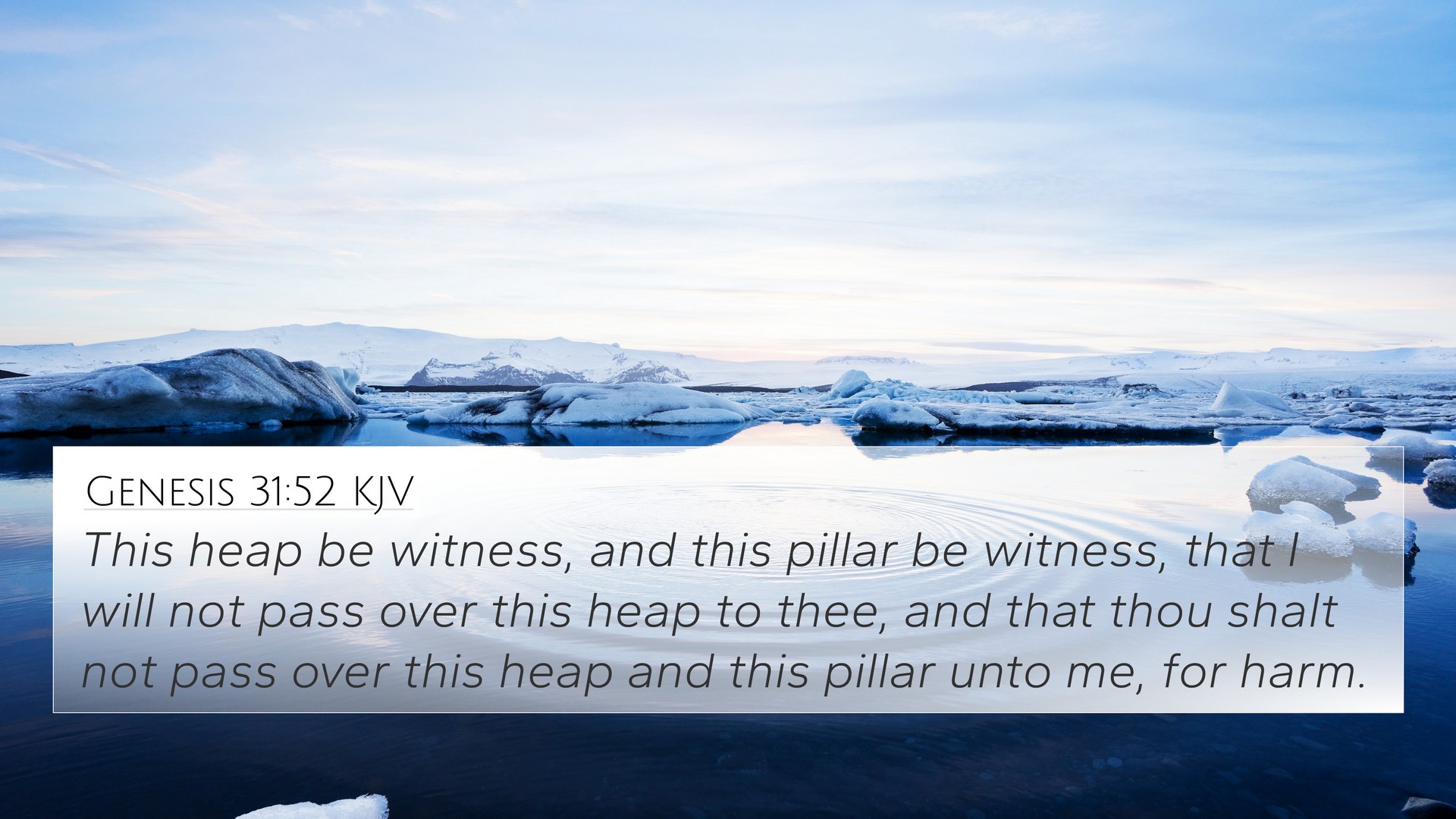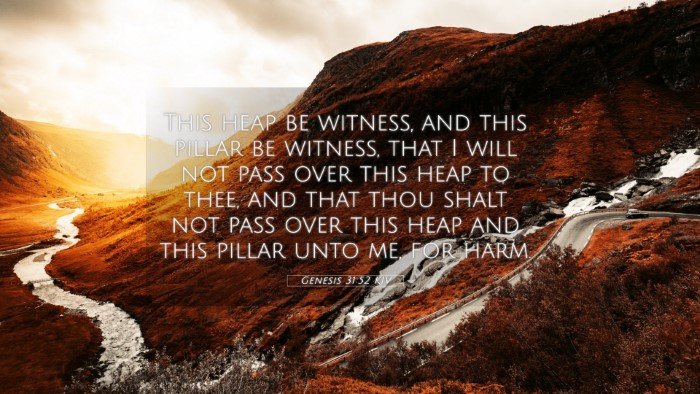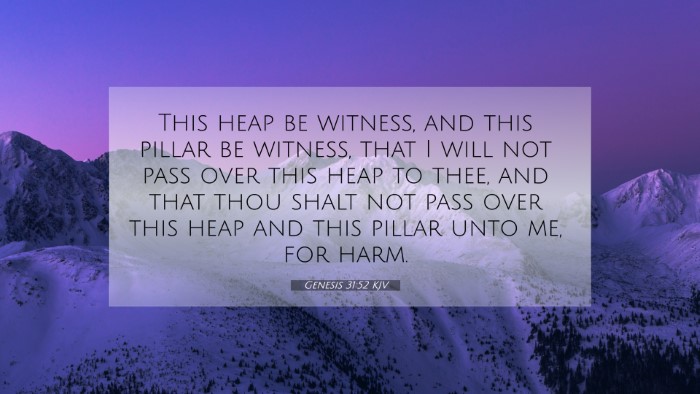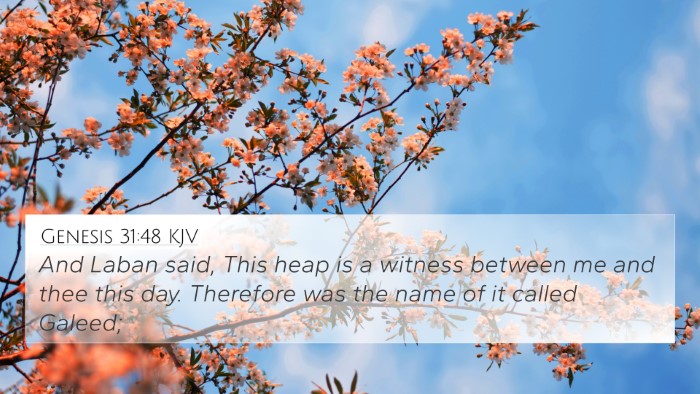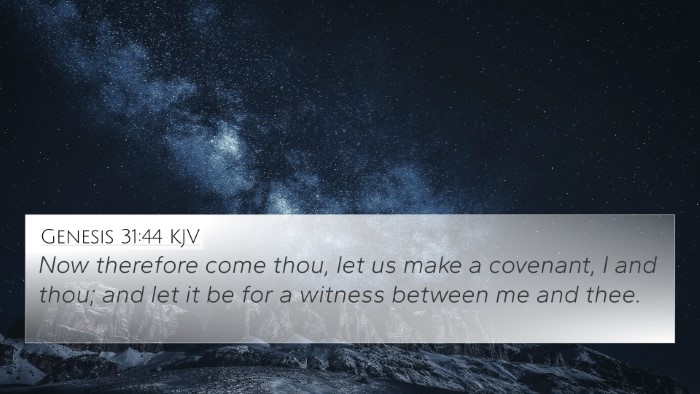Understanding Genesis 31:52
Verse Text: "This heap is a witness, and the pillar is a witness; that I will not pass over this heap to thee, and that thou shalt not pass over this heap and this pillar unto me, for harm." (Genesis 31:52)
Overview of Genesis 31:52
The context of Genesis 31:52 is rooted in the covenant made between Jacob and Laban. After much conflict over their respective herds and flocks, Jacob and Laban set up a heap of stones and a pillar as a boundary marker, signifying their agreement and oath to not harm each other.
Commentary Insights
This verse, hence, emphasizes the seriousness of the pledge made by both parties. Each commentary offers unique insights:
- Matthew Henry: Highlights the significance of agreements in relationships and the importance of integrity in dealings. The heap of stones symbolizes a lasting witness to their commitment.
- Albert Barnes: Focuses on the implications of the oath taken. Both men acknowledge the sacredness of the boundary established, understanding it as an acknowledgment of their separate paths henceforth.
- Adam Clarke: Points out the cultural practices of the time where physical covenants were made through such markers. He notes how these witnesses serve both as a deterrent against future transgressions and as a testimony to future generations.
Connected Themes and Cross-References
Genesis 31:52 can be seen as a pivotal point connecting various themes throughout Scripture. Below are key aspects and related Bible verses:
- Covenants: Genesis 15:18 - This establishes a precedent for formal agreements before God, symbolizing sacred commitments.
- Boundary Markers: Deuteronomy 19:14 - The importance of established bounds that must not be transgressed.
- Witnesses to Agreements: Matthew 18:16 - Emphasizes the necessity of witnesses in a legal context within the New Testament framework.
- Peaceful Resolutions: Proverbs 15:1 - The value of gentle answers in resolving conflicts aligns with the peace they sought in this covenant.
- Integrity in Relations: Ephesians 4:3 - Calls for unity and peace within the community, reminiscent of Jacob and Laban’s resolution.
- Divine Witness: Hebrews 6:13-17 - God’s role as the ultimate witness to human agreements mirrors the covenant spirit in Genesis 31:52.
- Separation for Peace: Romans 12:18 - Urgies believers to live peaceably with all, reflecting Jacob's intentions.
Inter-Biblical Dialogue
This verse reflects a broader Biblical narrative about human relationships and the importance of commitments:
- Old Testament Principles: The concept of boundary markers appears frequently, showcasing the need for respect in relationships.
- New Testament Expäansions: The idea of covenants is fulfilled in Christ, highlighting the ultimate reconciliation goal.
Thematic Connections
Genesis 31:52 stands as a pivotal point for the study of themes such as:
- Integrity: How promises and agreements should be honored.
- Conflict Resolution: Illustrating peaceful endings to disputes.
- Witnesses: The role of witnesses in biblical covenants.
Practical Applications
This verse and its underlying principles offer vital lessons for personal and community life today:
- Upholding Agreements: Encouraging individuals to be intentional in honoring their commitments to foster trust.
- Conflict Resolution Skills: Emphasizing the importance of peaceful negotiations in everyday challenges.
- Value of Community: Reinforcing the significance of maintaining healthy boundaries in relationships.
Conclusion
Genesis 31:52 teaches invaluable lessons about commitments, boundaries, and the importance of integrity in human relations. Understanding these principles through cross-referencing various Biblical texts enriches interpretation and application in our lives today.
